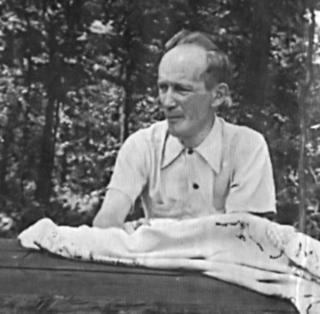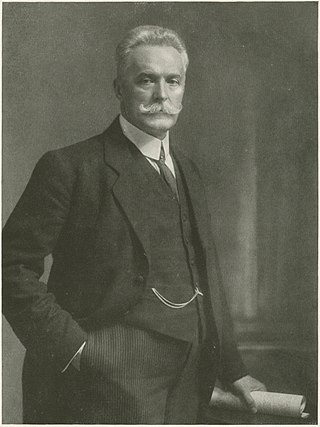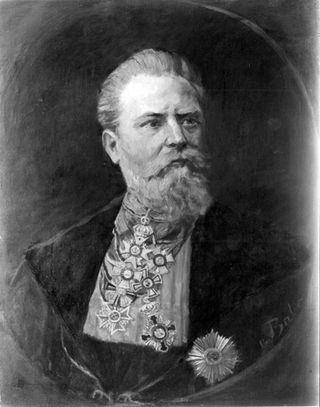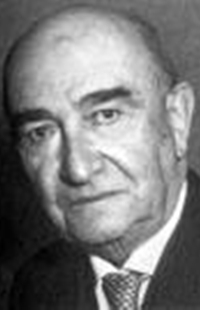Methodenstreit, in intellectual history beyond German-language discourse, was an economics controversy commenced in the 1880s and persisting for more than a decade, between that field's Austrian School and the (German) Historical School. The debate concerned the place of general theory in social science and the use of history in explaining the dynamics of human action. It also touched on policy and political issues, including the roles of the individual and state. Nevertheless, methodological concerns were uppermost and some early members of the Austrian School also defended a form of welfare state, as prominently advocated by the Historical School.

Gustav FriedrichSchmoller was the leader of the "younger" German historical school of economics.

Lujo Brentano was an eminent German economist and social reformer.
Gustav Cohn was a German economist, noted for his pioneering contributions to the theory and policy of transportation and public finance. He was educated at Berlin and Jena universities. During 1867 and 1868 he was the holder of a fellowship at the Royal Statistical Bureau of Berlin, and in 1869 became privat-docent at the University of Heidelberg, but in the same year accepted an invitation from the Polytechnikum at Riga. Cohn paid a visit to England in 1873, and the fruits of his observation and research were embodied in the masterly production "Untersuchungen über die Englische Eisenbahnpolitik," 2 vols., Leipzig, 1874-75. In 1875, he was invited to fill the chair of economics at ETH Zurich, which he held until 1884, when he became professor in the University of Göttingen.

Roman Osipovich Rosdolsky was a prominent Ukrainian Marxian scholar, historian and political theorist. Rodolsky's book The Making of Marx's Capital, became a foundational text in the rediscovery of Marx critique of political economy. As well as influenced later scholars such as Moishe Postone.

Heinrich Herkner was a German economist as well as a social reformer.
The Kölner Zeitschrift für Soziologie und Sozialpsychologie is a German academic journal for sociology. It has an empirical focus on social research, both qualitatively and quantitatively, often in the tradition of Max Weber's "Verstehende Soziologie". Articles are usually published in German with an abstract in English.
The German General Social Survey (ALLBUS/GGSS - Die Allgemeine Bevölkerungsumfrage der Sozialwissenschaften) is a national data generation program in Germany, which is similar to the American General Social Survey (GSS). Its mission is to collect and disseminate high quality statistical surveys on attitudes, behavior, and social structure in Germany.

Gustav von Schönberg was a German economist.
Frank Pfetsch was Professor of International Politics Emeritus at the Faculty of Economic and Social Sciences of the University of Heidelberg.
Journal of Economics, founded as Zeitschrift für Nationalökonomie, is an academic journal of economics with an emphasis on mathematical microeconomic theory, although it publishes occasional articles on macroeconomics.
The value judgment controversy (German:Werturteilsstreit) is a Methodenstreit, a quarrel in German sociology and economics, around the question whether the social sciences are a normative obligatory statement in politics and its measures applied in political actions, and whether their measures can be justified scientifically.
Manfred Rühl is a German communication scientist with a social science background.
August Lösch was a German economist, known for his seminal contributions to regional science and urban economics.

Leopold Max Walther von Wiese und Kaiserswaldau was a German sociologist and economist, as well as professor and chairman of the German Sociological Association.

Bernard Michael Gilroy is an American economist and full professor of international economics and macroeconomics at the University of Paderborn, Germany.
Natalie Moszkowska was a Polish socialist economist, who provided significant contributions to the Marxian theory of value and crisis regarding monopoly capital, and to the economic interpretation of military expenditures.
Friedrich Lütge was a German economist, social historian and economic historian.

Christoph Bernhard Cornelius Harms was a German economist and one of the first professors to undertake research in the field of international economics. He founded the Kiel Institute for the World Economy, Germany's leading economic research institute, in 1914. Harms was Chair of Economics at the University of Kiel and head of the Institute until he was dismissed from office in 1933 by Nazi Party officials.

The South German Customs Union was an attempt by various states in the German Confederation to create a unified customs area, in the early stages of German unification. After several failed attempts to bring in other states, a customs treaty was agreed between the Kingdom of Bavaria and the Kingdom of Württemberg in 1828. It was incorporated into the Prussian-led Zollverein in 1834.








